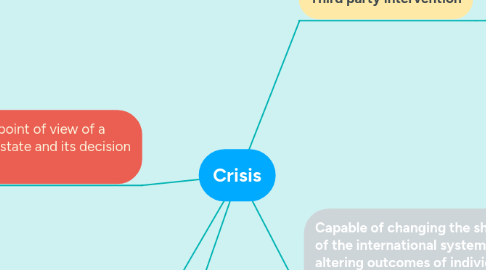Crisis
af Susana Arango


1. Larger system perspective
1.1. Increase in the intensity of hostile interactions between states
1.2. Increase in the probability of military hostility -> destabilizes their relationship and threats the stability of a regional subsystem or the entire int. system
1.3. ex: Berlin Crises of 1948, Cuban Missile crisis 1962, and 1973 Middle East War
2. From the point of view of a particular state and its decision maker
2.1. Crisis occur when the leaders of a country perceive a threat to basic values (territory, population, economy), an awareness of finite response time and an increase of probabilities of military hostile involvement
2.2. ex: John F. Kennedy when he removed the soviet missiles in Cuba in 1962
3. From the perspective of negotiation
3.1. The 3 key elements of crisis are threat, time pressure and accompanying stress that these engenders
4. MEDIATION ROLES IN INTERNATIONAL NEGOTIATIONS:
4.1. Major powers and small states; representatives of regional, global or security organizations; private citizens; religious organizations; special interest groups
4.2. Mediation styles:
4.2.1. - Formulative style: is more intrusive. The mediator helps parties formulate text designed yo move them closer to agreement

